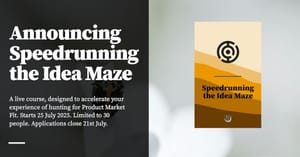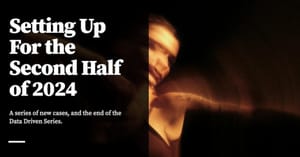I have three announcements to make today.
First, I’m pleased to announce the initial release of the Commoncog Case Library. This is a successor of the Case Library Alpha and Beta tests early last year, and is now completely rebuilt from the ground up — and on custom software.
Second, I’m making my series on Learning in Ill-Structured Domains free to all readers.
Third: with these changes, Commoncog’s direction and vision is — at long last — set up for the long term.
I’ll go through these three announcements, in order.
One: The Commoncog Case Library
About two years ago I stumbled onto Accelerated Expertise — a book that started out as a report commissioned by the United States Department of Defence. As long term readers may know, the book documents the best accelerated training methods known to man — or at least, known to the US military; I read the book in preparation for an interview with one of the authors, Dr Lia DiBello.
What I did not expect was for the book to contain an answer to a multi-year unsolved mystery I had — a mystery that, as far as I could tell, wasn’t talked about all that much. The mystery was this: how do the best investors and businesspeople learn from history? It’s widely known that Buffett, Munger and other like-minded investors read a lot. It’s also rather well known that a huge portion of Buffett and Munger’s reading is dedicated to biographies. But how, exactly, do they learn from such biographies?
I’ve covered this research in great detail elsewhere on this site — a series of essays that I’m releasing for free to the public today. (That’s Announcement Two, which we’ll get to in a bit). But in broad strokes, the theory explains that experts in domains like business and investing read histories for instantiations of concepts. They are forced to do this because concepts in business are highly variable and context dependent: each time you see a concept in the real world, it is going to be somewhat unique. In order to compensate for all of this uniqueness, experts in business and investing do their reasoning by combining fragments of prior cases they’ve seen.
In other words, the nature of skill in their domain demands that they constantly expand the set of cases they know. The more cases they know, the more cases they can draw fragments from, the better their expertise.
This helps explain what Buffett and Munger are doing when they’re doing all that reading: they’re basically collecting as many new instances of a ‘thing’ that they can find, in order to better reason about it in the future. I suspect that they think things like “oh, something like that can happen, and so it shouldn’t surprise me if something similar occurs in one of the businesses I’m involved with in the future.”
Compound this over a couple of decades, as Buffett and Munger have done, and you have something approaching skill.
In their work, the researchers describe a method to accelerate such expertise:
- Instead of letting the student collect cases for each concept through hard-won experience, prepare 10-20 cases for each concept. The more varied the cases, the better.
- Present the student with such a case library, and get them to reference it whilst accomplishing problem-solving tasks. Ask them to draw on fragments from each case when diagnosing a new situation.
- Teach the student to compare against prior cases whenever they encounter a new case (or as they are browsing the library). Tell them to ask themselves “What are some surprising similarities with this case, compared to prior cases I know? And what are some surprising dissimilarities?” Do this for everything, even books and anecdotes from other practitioners.
- The goal is for the student to internalise the features of the most important, most referenced cases for each concept.
- Rinse and repeat for every concept that matters. The richness of these domains imply that cases will be heavily intertwined, and interlinked with other cases and other concepts.
The original researchers then applied this method to battleground decision-making, to heart attack diagnosis, and finally — and most recently — to reading comprehension.
After which, the researchers in Accelerated Expertise took those ideas and applied them to yet more training purposes, some of which are still classified.
The goal of the Commoncog Case Library is to take this theory and to apply it to business and investing.
You may view it here.
Library Features
In our Alpha and Beta tests, we sent a series of cases to readers through an email drip sequence. We’ve learnt a number of things from that experience, some of which is incorporated into this initial version of the Case Library.
- The first thing is that we’re launching it on the web. One big lesson that we learnt is that many readers preferred to read cases on their own time, and at their own pace. Many have said that they got the maximum learning out of the Alpha and Beta when they read all the cases in a row. One beta test participant told me that he only realised what I was trying to communicate after he reread all the case emails he had been sent in a single sitting. We’re responding to that by releasing all our cases in a browsable interface.
- The second thing we’re doing is in response to the roughly two thirds of participants who said they wanted more context around cases. We’ve done two things here: the first being that — initially, at least — many of Commoncog’s cases will be in service of and embedded within Commoncog blog posts. In fact, I’ve been writing much of the Capital Expertise and Becoming Data Driven series with this functionality in mind. If you go back to old pieces in both series, you’ll find that many of the posts now display Case Library embeds. (See this one, for example). Case Library embeds are powered by the wonderful Quotebacks library. In addition, we’ve added commentary functionality. We haven’t enabled this yet … but soon, clicking on a concept should show you staff commentary, along with highlights in the text of the case.
Of course, since this is completely custom software, we are free to add whatever functionality we wish in the future. We may add email sequencing. We think some highlighting is a good idea. We intend to let members export cases as ebooks. And we want to have certain concept sequences available for sale to non-members — at least for those who do not wish to pay for a full membership.
Access to some of the cases in the Commoncog Case Library will be gated to members. The library comes bundled with a Commoncog membership.
Watch this space; we’ll be announcing new features soon.
Two: Setting the ‘Learning in Ill-Structured Domain’ Series Free
My second announcement is tied to the first.
The name of the theory that underpins Commoncog’s Case Library is ‘Cognitive Flexibility Theory’, or CFT. I did a deep dive on every paper published on it shortly after learning of the theory, and wrote a series of posts on what I found. That series was mostly gated to members. I’m now making it free.
I believe that this expertise research is valuable in and of itself. As of right now, it’s not broadly used outside of the military (though I’ve talked to some researchers who are interested in doing more applied work with it — and who are welcome to experiment with the Commoncog Case Library when we’re further along!) Overall, the lack of attention on this theory is quite surprising. You would think that a theory with a track record of applied success would be interesting to folks outside of the military-industrial complex! And yet it isn’t.
I don’t have a definitive answer for why that is. I talked to Professor Rand Spiro, the primary researcher behind CFT, and he told me that sometimes it just takes a long time for acceptance to build. I buy that. I also suspect that the military is not particularly interested in publishing papers, and that educational journals and/or institutions are not particularly interested in working systems that challenge their existing systems. But what do I know.
Releasing this series is a win-win for Commoncog. The more people know about CFT, the more useful the Case Library will be. As it is, CFT has been covered by Tom Morgan and by Frederik Gieschen on their respective Substacks. But more people should know about it, I think.
Even if you don’t wish to pay for a Commoncog membership, I think it’s still useful to guide your own learning.
You may find the full series here.
Three: Commoncog’s Long Term Direction
It is no accident that Commoncog’s most recent series have both been written with the Case Library in mind. In particular, I was deliberately using the ideas of CFT to write the Capital Expertise series — leading one (new) reader to ask if I was writing for entertainment or for instruction.
I had to point him to my tentpole piece on CFT before he understood what I was trying to do.
What I was really doing was experimenting. I wanted to see how far I could push this focus on cases. I’m somewhat pleased with the results.
Over the next year, Commoncog will slowly focus on cases as a method of accelerating your business expertise. To me, this makes intuitive sense. We have places to learn business concepts: these are called business schools. We all know that there is a two year thing called an MBA that teaches you a buffet of business concepts (whilst giving you an — arguably more important — signalling credential). We also have a way to learn frameworks, which most of us get through books and blog posts and podcasts. But we do not have an efficient method for rapidly expanding our case-based pattern recognition, apart from a) living a full business life, or b) executing a decades-long reading program ala Buffett and Munger.
If I get this right, Commoncog will be that method.
Of course, there will be aspects of business expertise that can only come from practice. But there is a pattern recognition aspect to business expertise that can be accelerated by this case library approach, and I fully intend to exploit that.
One way of looking at these changes is that Commoncog will increasingly become a platform that sucks up the world’s business history — currently locked away in books, filings, podcast episodes, and articles — in service of accelerating expertise. Initially, this will be slow going. I will — and have already begun — the process of coming up with a scalable and repeatable mechanism for producing cases. Some of these things are in flight. Others I still have to figure out. You should begin to see the fruits of this by the middle of next year.
Whilst that is ongoing, we plan to release more features. At minimum, members should have a variety of ways to consume cases: to listen to them, to read them, to carry cases with them on flights or on beaches, and to share their favourite case sequences with others on their teams and in their businesses. In time, we want to give members the ability to contribute to the library itself: to create community-sourced concepts, to provide case analysis of their own, and, eventually, to feed new cases back into the system — regardless of source medium. This will take time, as with most software-and-community-driven flywheels. But if we do things right, we should create a compounding asset that benefits everyone who participates.
I’ll state my goal plainly now: the end goal for Commoncog is to be nothing less than the world’s richest and largest storehouse of business concepts and its various instantiations. I expect this to take years.
Some Notes on Sustainability
With this release, Commoncog is finally set up for long-term compounding. One thing that has bothered me over the past two years is that Commoncog is built on an unsustainable premise: that is, it is written from practice, and built around a hierarchy of practical evidence. This was well and good up to a few years ago, when I had a reservoir of business experiences to draw from (and, to be fair, I still have a few good stories I cannot yet tell publicly). But that reservoir is drawing down. Worse, practice takes time. My attempt to master the Amazon PR/FAQ took eight months, my attempt to learn the Amazon Weekly Business Review took six months of learning under Colin Bryar, and another six months of practice — and is still ongoing. My Judo deliberate practice experiment — as long-term readers may well know — took five hours of training every day for a four month period, at great physical cost.
Such experiments will only increase in length and in difficulty as I climb further up the business skill tree.
There are also two more factors that I think about. The first: a big part of the draw for Commoncog is the fact that I’m writing from experience. I’ve lost count of the number of people who have said that they read Commoncog mostly because they can tell I’m serious about ideas that work. To paraphrase a business mentor: “the reason I trust your writing is because I know you test against reality.” To quote another reader: “this is the most consistently useful business writing I’ve found.”
But therein lies the problem: the reason my writing is useful is because I derive most of my joy from ‘testing against reality’. The same mentor pointed out that it takes a certain kind of crazy to move to a different city to train Judo full time for four months. I was a little startled when he said that … and then I realised that he was right. And perhaps this will not come as a surprise to long term readers: many of you can probably tell that I’m writing for a purpose. I’m doing this to level up in business and in life, and I just happen to be taking you along for the ride.
This won’t last.
At some point I’ll go back to doing these things. This is underscored by the fact that I am now — post-Judo experiment — more aware of what truly gives me joy. Six years ago I helped my old boss build up a S$4.5 million annual revenue Point of Sale business from scratch; he’s since taken the foundation we built together, grew the business, hit his number and retired. In 2018 I started helping a friend with content marketing for his bootstrapped SaaS company; I doubled their annual recurring revenue at the end of two years and then left. If you asked me what I enjoyed more: writing Commoncog or building these things, figuring these things out, getting them to work … and then leaving behind systems and people to continue that work in my absence — I can tell you in a heartbeat: I get more joy out of building those things.
I like writing. But I like operating more.
So where does that leave Commoncog? Does it mean I’m going to leave soon? The answer is no, not yet. But it’s definitely a lot more possible once Commoncog shifts to becoming this platform. I’m quietly confident that I can build a machine that compounds the library within the next two years. And I’m quietly confident that Commoncog can continue growing for at least a decade afterwards. Commoncog is, after all, a good business. It’s doubled in revenue every year since I started memberships. It’s extremely capital efficient. And thanks to the Amazon-style Weekly Business Review, I’m starting to wrap my head around how it really grows.
But let’s not get distracted. The goal is to build the world’s richest and largest storehouse of business cases, for your benefit. There’s a lot to figure out. Onward.
Originally published , last updated .





